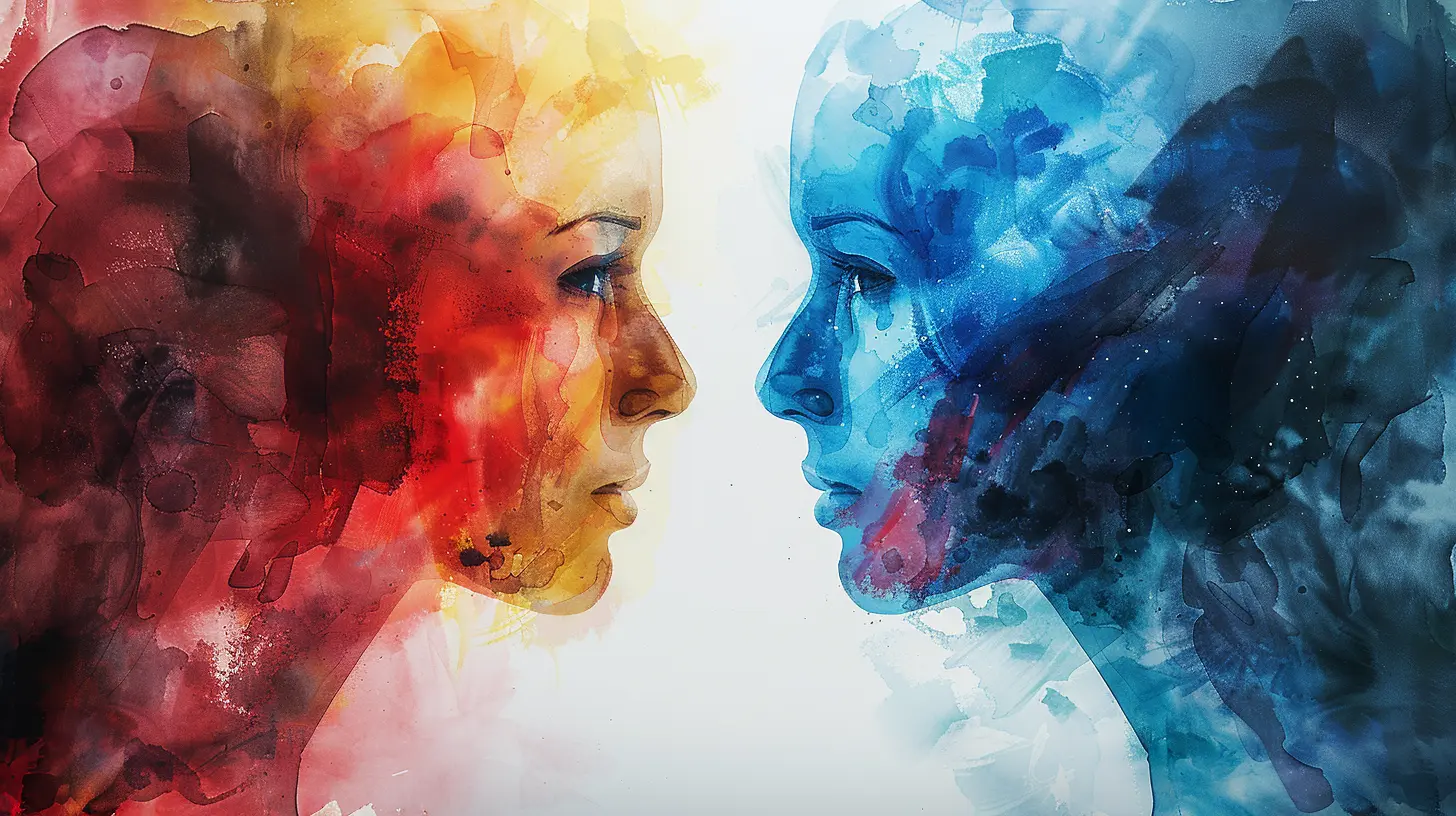Understanding the Connection Between Autism and Mental Health
15 October 2025
When we talk about autism, most people immediately think of challenges with social interactions or repetitive behaviors. But there's another piece of the puzzle that doesn’t get enough attention—mental health. Understanding the connection between autism and mental health is crucial, not just for professionals, but for parents, caregivers, and even individuals on the spectrum themselves.
Let’s break it down together. This topic can get heavy, but I’ll keep it simple, relatable, and totally human.
What Is Autism, Really?
Autism, or Autism Spectrum Disorder (ASD), isn’t just one thing. It’s a spectrum—kind of like a rainbow of different traits that show up in different ways in each person.Some folks with autism may struggle with social situations, others might be super sensitive to sights or sounds, and some might have intense focus on specific interests. That’s what makes ASD so unique—no two people experience it exactly the same way.
Now, throw mental health into the mix, and things can get even more complex.
Peeling Back the Layers: Mental Health in the Autism Community
Let’s imagine autism is like an onion. Each layer—sensory sensitivity, communication challenges, changes in routine—can add emotional stress. Over time, that stress can wear anyone down. So it’s no surprise that many autistic individuals also deal with mental health conditions.But here’s the jaw-dropper: people with autism are significantly more likely to experience anxiety, depression, and even conditions like OCD or ADHD compared to neurotypical peers.
Let’s take a closer look at some of these common comorbid (that’s a fancy word for “simultaneously occurring”) mental health conditions.
Anxiety and Autism: The Constant Companion
Ever had that gut-wrenching nervous feeling before a big test or presentation? Now imagine feeling that every day over basic things like making eye contact or dealing with a loud classroom. That’s anxiety for many autistic people.Why Is Anxiety So Common in Autism?
- Sensory Overload: Picture having mega-sensitive hearing in a noisy cafeteria. That can trigger stress in seconds.- Unpredictability: Many folks on the spectrum thrive on routine. Sudden changes? Major anxiety trigger.
- Social Pressure: Navigating small talk or reading facial expressions can feel like climbing Mount Everest.
The anxiety-autism link isn’t just a coincidence. The very way the autistic brain processes the world can feed anxious thinking.
Depression in Autism: A Hidden Struggle
Depression often flies under the radar in the autism community, especially since many signs of depression (like withdrawal or flat affect) can be mistaken for typical autism behavior.What’s Fueling Depression in Autistic Individuals?
- Social Isolation: Wanting connection but struggling to maintain it? That’s a lonely road.- Bullying or Stigma: Being constantly misunderstood chips away at self-esteem.
- Masking: Trying to "act normal" all day is exhausting. It’s like wearing a mask 24/7—and it can lead to burnout and depression.
The sad truth? Many people with autism don’t receive proper mental health care because their emotional needs are overlooked or misunderstood.
ADHD, OCD, and Other Overlapping Conditions
Here’s something wild: around 30–80% of individuals with ASD also meet criteria for ADHD. And a significant number also deal with OCD (Obsessive Compulsive Disorder). But differentiating between autism traits and these conditions can be like trying to separate salt from sugar once they’re mixed.Common Overlaps
- Repetitive behaviors (Autism) vs. Compulsions (OCD)- Attention difficulties (ADHD) vs. intense focus (Autism)
- Impulsivity (ADHD) vs. sensory seeking behaviors (Autism)
Getting an accurate diagnosis is tough but super important. One-size-fits-all approaches just don’t work here.
The Importance of Early Diagnosis and Holistic Support
Mental health issues often sneak in early. Kids with autism might experience anxiety before anyone even notices the signs of autism. That’s why early diagnosis and whole-person care matter big time.Think of it like tending a garden. If you notice a plant’s leaves drooping, it’s not enough to just water it—you have to check the soil, sunlight, and even the pot it’s growing in. Same goes for supporting autistic individuals. We’ve got to look at the full picture.
What Can Early Intervention Do?
- Reduce long-term mental health issues- Improve coping skills
- Help families understand and support better
It’s not about “fixing” someone. It’s about helping them bloom in the way that’s right for them.
Mental Health Treatment: What Works for Autistic Individuals?
Traditional mental health treatments don’t always hit the mark with autistic folks. For example, talk therapy may not be effective if someone struggles with verbal communication or emotional expression. So what’s the alternative?Tailored Therapies
- Cognitive Behavioral Therapy (CBT): Works well when adapted for autism.- Mindfulness Techniques: Helps with emotional regulation and sensory awareness.
- Art or Music Therapy: Great for non-verbal expression.
- Medication: Sometimes useful—though always under close professional guidance.
The key? Therapists who truly get autism. Cookie-cutter approaches just don’t cut it.
The Role of Family and Social Support
Let’s be real—mental health doesn’t exist in a vacuum. The support (or lack of it) that a person receives plays a huge role.What Can Families and Friends Do?
- Validate Emotions: Even if you don’t “get it,” let them know it’s okay to feel whatever they feel.- Advocate: Help navigate confusing systems like school supports or insurance.
- Encourage Self-Care: Whether it’s stimming, downtime, or favorite hobbies—respect their needs.
- Stay Curious: Ask questions, do some reading, and keep the conversation going.
Relationships can be lifelines. A little understanding goes a long way.
Breaking the Stigma: Mental Health and Autism Are Not Separate
Here’s the truth bomb: separating autism from mental health is like separating your head from your heart—they’re connected, always.We’ve got to stop seeing autism and mental health as two unrelated things. They’re intertwined. That means mental health care should be part of autism support from day one—not just an afterthought when things go wrong.
And for autistic people to feel truly seen, supported, and safe, we need a system that listens to their needs—not just labels them.
Advocacy, Awareness, and Allyship
Raising awareness isn’t just about catchy Instagram posts in April. It’s about pushing for real, lasting change in mental health services, education systems, and public attitudes.Want to Be an Ally?
- Listen more than you speak- Support inclusive mental health resources
- Challenge stereotypes when you see them
- Amplify autistic voices
Being an ally doesn’t mean having all the answers—it just means showing up and caring enough to learn.
Final Thoughts: It’s About More Than Labels
Autism isn’t a disorder in need of fixing. It’s a different way of experiencing the world. But when mental health struggles pile on, life can feel overwhelming—especially when the systems meant to help are ill-equipped to handle such complexity.Understanding the connection between autism and mental health is more than an intellectual exercise—it’s a call to action. To listen better. To support differently. To care more holistically.
So the next time you meet someone with autism, don’t just think about their diagnosis. Think about their humanity, their mental well-being, and the mountain they may be climbing just to get through the day.
It’s time we climb with them—not against them.
all images in this post were generated using AI tools
Category:
Psychological DisordersAuthor:

Ember Forbes
Discussion
rate this article
1 comments
Amy Bryant
Great insights on autism's impact on mental health—essential reading for awareness!
November 3, 2025 at 3:57 AM

Ember Forbes
Thank you! I'm glad you found it valuable for raising awareness.


